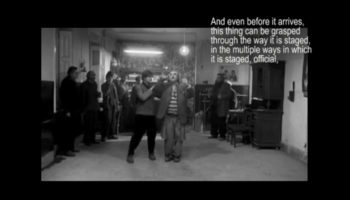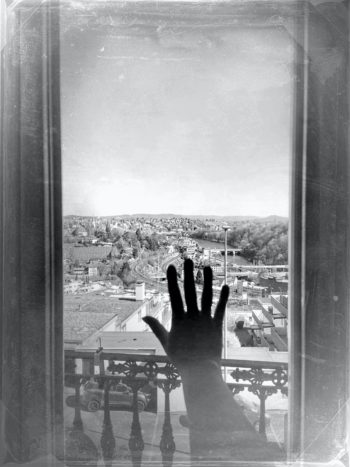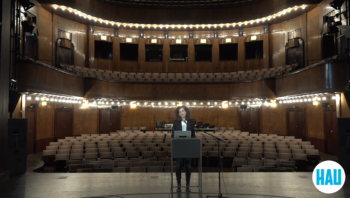The Community of the Forsaken: A Response to Agamben and Nancy
Text: Divya Dwivedi Shaj Mohan
Mar 17th 2020
India has for long been full of exceptional peoples, making meaningless the notion of “state of exception” or of “extending” it. Brahmins are exceptional for they alone can command the rituals that run the social order and they cannot be touched by the lower caste peoples (let alone desired) for fear of ritualistic pollution. In […]
Read more
The philosophical debate about biopolitics in times of CoVid-19
Apr 5th 2020
At the end of February, the philosopher Giorgio Agamben reacted to the measures taken by the Italian government to face the CoVid-19 pandemic. “[T]he invention of an epidemic”, he wrote, “could offer the ideal pretext for broadening such measures beyond any limitation”[1] and thus reinforced his well-known thesis on the normalisation of the use of […]
Read more
What Carries Us On
Text: Shaj Mohan
Mar 22nd 2020
Implicit within the debate on Coronavirus curated by Antinomie and archived by Sergio Benvenuto is the question—for what must we carry on? That is, do we—humanity, which has been reckoned by many thinkers as the error in nature—carry on for the sake of carrying on? Or, should we, following Thomas Taylor, M. K. Gandhi, Pierre Clastres, and several others, proceed with a project of returning towards a moment in history that, for Agamben, is “the normal conditions of life”. The text is part of a conversation between Jean-Luc Nancy and Shaj Mohan.
Read more
Coronavirus: a disaster of capitalism’s making
Text: Ben Hillier
Mar 7th 2020
What to do if confronted with an extremely contagious virus that medical experts say they have not seen before and don’t understand, and which is fast spreading and killing hundreds of people? a) Take precautionary measures to stop the virus spreading and prepare the health system for a potential shock? Or b) Ignore it, blithely […]
Read more
Our Mysterious Being
Text: Jean-Luc Nancy Shaj Mohan
Apr 17th 2020
Considering CoVid-19 a “communovirus”, the French philosopher Jean-Luc Nancy ponders the official Chinese communism as well as Marx’s notion of individual property and self-realisation. By isolating us, the “communovirus” makes us experience the “shared sense of our uniqueness”, which, according to Nancy, reveals our “most intimate community”. Starting from the question of whether there is a norm for man, Shaj Mohan introduces in his answer to Jean-Luc Nancy the concept of the obscure experience. For the Indian philosopher, this experiences shared by the commonplace allow us to reflect on future forms of our being together.
Read more
BEHAVE, O BODY: scripting my corporeality in face of Covid-19
Text: Nina Seiler
May 4th 2020
In recent weeks, one practice in particular became (in)famous in slowing down the Covid-19 pandemic: social distancing. But the strategy of „distancing“ first and foremost means physical separation and disciplining along scripts for the performance of bodies. Thus, the interaction with others and ourselves gains an edge on body awareness. A glimpse at a corporeality in Zurich, Switzerland.
Read more
Wirus kapitalizmu
Text: Przemysław Wielgosz
May 20th 2020
Prawda o nieludzkim i antydemokratycznym charakterze kapitalizmu rzadko bywa tak dobrze widoczna jak podczas pandemii, której jesteśmy świadkami. Zarazem jest ona okazją do postępowej zmiany społecznej na wielką skalę. Czy to prawda, że jak mawiał Mao Zedong, skoro na świecie zapanował chaos, sytuacja jest znakomita?
Read more
Requiem for the Students
Text: Giorgio Agamben
May 26th 2020
Giorgio Agamben writes about the end of being a student as a form of life and about the decay of universities in the times of e-learning.
Read more
Правоугаони (п)оглед – der rechteckige Versuch
Text: Haris Kurtisi
May 27th 2020
In einer Selbstreflexion versuchte ich anhand der aktuellen Situation rund um Corona, Lockdown und Pandemie mir ein Bild darüber zu machen, was ein Mensch zu Hause in Selbstisolation erlebt und welche Fragen einem beschäftigen. Seht es als Dokumentation oder Inszenierung – oder beides!
Read more
“The Scattered Community of the Eclipsed”. Paradigms of Belonging in the Wake of the 2020 Pandemic
Text: the Community of unfaithful echoes
Jun 14th 2020
To face. To question one’s own presence towards what is present. Not giving up the potentiality for suspension that the event offers, but rather inhabit it fully. To form a community of the event, the scattered community of the eclipsed. The Film “The darkness of the eclipse” is a first fragment of a series presented by the Community of unfaithful echoes.
Read more
Lockdown hinter einem Fenster
Text: Valeria Egli
May 27th 2020
Abstandhalten, Maskenpflicht, Ausgangssperre… Das ist kein Horrorfilm, das ist unsere Realität. Im Jahr 2020 leidet die ganze Welt unter einem gefährlichen Virus und alle Menschen sind davon betroffen – wir sind alle wegen des Virus in unserem Alltagsleben eingeschränkt. In meiner Fotoserie will ich mithilfe des Motivs von Fenstern versuchen, unsere heutige Zwangssperre wiederzugeben.
Read more
“I can’t breathe”: Riots against racism as new grounds for international solidarity
Jun 23rd 2020
“I can’t breathe”: the last sentence of the African-American George Floyd, who was stifled by the Minneapolis police, resonates powerfully in the context of the Covid-19 pandemic. Indeed, the global health crisis has highlighted the inequalities in health care systems, especially in the US, where the African-American population is particularly affected. Beyond police violence, it […]
Read more
«The silence on the streets should never be mistaken for a quiet submission in politics» – An interview with Shaj Mohan
Text: Krithika Varagur
Jul 12th 2020
In the interview with Krithika Varagur philosopher Shaj Mohan talks about the protests in India and its similarities to the situation in the United States. He points out that what we perceive as extreme events, such as pogroms and lynching, are prepared by everyday discriminations.
Read more
Der gemeinschaftliche Theatertraum in Covid-19-Zeiten
Text: Louise Décaillet
May 19th 2020
Die Pandemie des Covid-19 trifft im Theaterbetrieb einen besonders sensiblen Nerv. Von der physischen Bühne zum bodenlosen Cyberspace, vom Publikum zur unsichtbaren Internet-Crowd ist der „gemeinschaftliche Traum“ neu zu erfinden, und dies unter technisch-ästhetischen Bedingungen, die das Theater eher wie ein alter Alptraum anmuten lässt. Doch über die jetzige Krisensituation hinaus mag dies dazu ermuntern, das „Gemeinsame“ des Theaters bzw. der Kunst in einer digitalisierten Kultur zu reflektieren.
Read more




